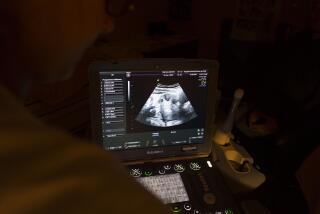Why Not Clone Our Best and Brightest?
- Share via
Everybody but me seems to hate the idea of freezing Ted Williams with an idea toward reviving him and his talents, maybe, some day.
Bob Ryan, columnist for the Boston Globe, snarled that the late baseball legend’s son, John Henry Williams, was “reprehensible” and “shameless” for arranging to have his father cryonically frozen in a Scottsdale, Ariz., facility. Dean Juipe of the Las Vegas Sun sniped that the younger Williams was “exploitative” for seeking, potentially, to sell off his father’s body--or perhaps just his DNA--to fans and wannabes. Sally Jenkins of the Washington Post was even more vehement, recalling that she had “learned in school that there is a term for the idea that some people’s DNA is more valuable than others, and the term is fascism.”
Tough talk aside, most scientists don’t believe it will ever be feasible to thaw out and reanimate a body, as in one of the “Austin Powers” movies. But most experts do forecast the possibility of manipulating DNA--deoxyribonucleic acid, the source code of life itself--so as to generate back-from-the-dead miracles from tiny clumps of cells, as in “Jurassic Park.” In May, a team of Australian researchers announced that they were within a decade of reviving the Tasmanian tiger, which went extinct in 1936. The last critters had been preserved in ethanol, but even after seven decades of pickling, their life code was still valid.
“The supposedly dead DNA in fact reacts in the way live DNA does,” one scientist told Reuters in May. “It makes molecule cloning possible.”
If so, then it won’t be hard to re-create another kind of mammal--Homo sapiens. Speaking of fascism, wasn’t that the plot of the ‘70s novel and movie “The Boys From Brazil,” in which a Nazi scientist produces young Adolf Hitlers? Well, nobody wants a neo-Nazi, let alone the real thing, but the technology to re-create bad guys is already loose in the world. Indeed, clone tech is loose in the U.S.
Even allowing for the infinitesimal prospect of a junior Hitler being hatched somewhere, most scientists are busy looking at the 100% prospect of using new therapeutic cloning techniques to cure here-and-now diseases. That logic is so strong that the President’s Council on Bioethics--handpicked by George W. Bush with an eye toward banning all forms of human cloning, even for medical research--couldn’t agree on a common anti-cloning position when it issued its report last week. So, most likely, progress toward cloning will continue, albeit at different speeds, in the U.S. and other countries.
Meanwhile, Williams’ last wishes should be respected. And if that means cremation without the slightest DNA extraction, so be it. But such a genetic annihilation would be an enormous loss to society because Williams, famous for his 20:10 eyesight and natural swing, would have much to offer medical researchers, kinesiologists and, yes, possibly, future baseball players who might benefit from having some of their DNA derived from the .344 lifetime hitter.
Obviously this sort of bio-utilitarian approach will give some folks pause. Yet the inescapable reality is that scientists are not pausing at all but rather rocketing out even further, pushing DNA manipulation far beyond such benign goals as making a better batter.
On Thursday, researchers at the State University of New York at Stony Brook announced they had synthesized a live polio virus from chemicals, using a machine to tap out the virus’ DNA code. In other words, it’s probably only a matter of time before science finds a way to whomp up the perfect baseball player, or the perfect whatever, from scratch materials.
So the idea of using people as the basis for improving future people suddenly seems rather congenial. The 19th century poet and critic Matthew Arnold spoke of touchstones of excellence, arguing for propagating “the best that is known and thought in the world.”
Why shouldn’t we expand Arnold’s concept to other sorts of touchstones, to include the halest and heartiest of humans? Why not strive for a cultural shift, in which the brightest and ablest among us are encouraged to make one final, but also deeply enduring, contribution to our common human heritage?
*
James P. Pinkerton writes a column for Newsday in New York.






